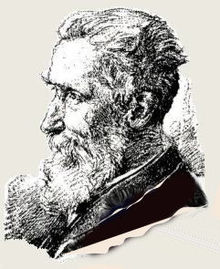Eduard Seler
Eduard G. Seler | |
|---|---|
 Eduard Georg Seler | |
| Born | December 5, 1849 |
| Died | November 23, 1922 (aged 72) |
| Nationality | German |
| Occupation(s) | Anthropologist, ethnohistorian, linguist, epigrapher |
Eduard Georg Seler (December 5, 1849 – November 23, 1922) was a prominent German anthropologist, ethnohistorian, linguist, epigrapher, academic and Americanist scholar, who made extensive contributions in these fields towards the study of pre-Columbian era cultures in the Americas.
Research[edit]
Seler is best known for his foundational studies concerning the ethnography, documents, and history of Mesoamerican cultures, for which he is regarded as one of the most influential scholars active around the turn of the 20th century.[1] Seler laid many fundamentals in understanding and deciphering the Aztec pictorial script. A main contribution was the re-discovery and analysis of the basic Aztec calendar system: the existence of two Aztec calendars, a 365-day solar profane (everyday use) and a 260-day religious calendar. He also noted from the sources that the ceremonial killing victim figures alleged by Spanish priests and military (repeatedly reported as being greater than 10,000 or even 100,000) were most probably vastly exaggerated propaganda. This was supported by excavations in the late 20th century.[citation needed]
Being poor and of ailing health, he was helped and supported for decades by his wife Cäcilie (Cecilia) Seler-Sachs (1855–1935), physically and intellectually. Her photos of Aztec temples and pyramids are still useful to scientists, and after her husband's death she went about verifying his works and publishing them. Seler was also helped by Mexican scholar and historian Antonio Peñafiel.[2][3]



Timeline[edit]
- 1863-69 — Attendance at Joachimsthalsche Gymnasium, Berlin
- 1870-71 — Military service (during the Franco-Prussian War)
- 1871-75 — Studied at University of Berlin
- 1875-79 — Teaching science and mathematics
- 1887 — Doctoral degree from University of Leipzig
- 1895-97 — Investigation of Maya cave sites including Quen Santo[4]
- 1904-22 — Directorship of American Division, Königliches Museum für Völkerkunde in Berlin
Writings by Eduard Seler[edit]
- Gesammelte Abhandlungen zur Amerikanischen Sprach- und Alterthumskunde. 5 vols. Berlin : A. Asher, 1902-1923.
- Collected Works in Mesoamerican Linguistics and Archaeology. Culver City (CA) : Labyrinthos, 1990-1998; translated (by Charles P. Bowditch & Frank E. Comparato) into English.
Notes[edit]
- ^ Nicholson 1973, p. 348
- ^ Eduard Seler und Cäcilie Seler-Sachs, Pionere der Altamerikanistik (in German). Berlin: Freie Universität. 2006.
- ^ Der Geheime Code der Azteken, ein Dokumentarfilm von Saskia Weisheit, Deutschland 2009 (in German). Released on TV channel Arte. August 15, 2009.
- ^ James Brady. "Using 19th Century Scholarship on a 21st Century Archaeology Project".
References[edit]
- Adams, Richard E.W. (1991). Prehistoric Mesoamerica (Revised ed.). Norman: University of Oklahoma Press. ISBN 0-8061-2304-4. OCLC 22593466.
- Coe, Michael D. (1992). Breaking the Maya Code. London: Thames & Hudson. ISBN 0-500-05061-9. OCLC 26605966.
- Houston, Stephen D. (2001). "Antiquities of Guatemala". In Oswaldo Fernando Chinchilla Mazariegos; David Stuart (eds.). The Decipherment of Ancient Maya Writing. Norman: University of Oklahoma Press. pp. 465–469. ISBN 0-8061-3204-3. OCLC 44133070.
- Nicholson, H. B. (1973). "Eduard Georg Seler, 1849–1922". In Howard F. Cline (Volume ed.), John B. Glass (Associate vol. ed.) (ed.). Handbook of Middle American Indians, Vol. 13: Guide to Ethnohistorical Sources, part II. R. Wauchope (General Editor). Austin: University of Texas Press. pp. 348–369. ISBN 0-292-70153-5. OCLC 163392725.
- Schumacher, Gudrun; Gregor Wolff (November 2004). Nachlässe, Manuskripte, und Autographen im Besitz des IAI (PDF). Abteilung 2, Referat 1: Nachlässe und Sondersammlungen (in German). Berlin: Ibero-Amerikanisches Institut, Preußischer Kulturbesitz. OCLC 162302418. Archived from the original (PDF) on 2018-10-08. Retrieved 2008-04-11.
- Sellen, Adam T. (2006). "Re-evaluation of the Early Archaeological Collections from Oaxaca: A Trip to the Seler Archives in Berlin". The Foundation Granting Department: Reports Submitted to FAMSI. Foundation for the Advancement of Mesoamerican Studies, Inc. (FAMSI). Retrieved 2008-04-09.
- Stuart, George E. (1992). "Quest for Decipherment: A Historical and Biographical Survey of Maya Hieroglyphic Investigation". In Elin C. Danien; Robert J. Sharer (eds.). New Theories on the Ancient Maya. University Museum Monograph series, no. 77. Philadelphia: University Museum, University of Pennsylvania. pp. 1–64. ISBN 0-924171-13-8. OCLC 25510312.
- Taube, Karl A. (1993). Aztec and Maya Myths (4th University of Texas printing ed.). Austin: University of Texas Press. ISBN 0-292-78130-X. OCLC 29124568.
- Thompson, J. Eric S. (1950). Maya Hieroglyphic Writing: Introduction. Carnegie Institution of Washington Monograph series, no. 589. Washington, DC: Carnegie Institution of Washington. OCLC 497712.
External links[edit]
- Werke Eduard Selers at altamerikanistik.de
- biography of Eduard Seler
- Fundación Eduard Seler, non-profit association established 1992 in Mexico City, named after Seler and devoted to the archaeology, ethnohistory and indigenous concerns of the region studied by Seler (in Spanish)
Over a hundred images of Uxmal in Seler's 1917 "Ruinen von Uxmal". http://academic.reed.edu/uxmal/galleries/thumbnails/drawings/Drawings-Seler.htm
